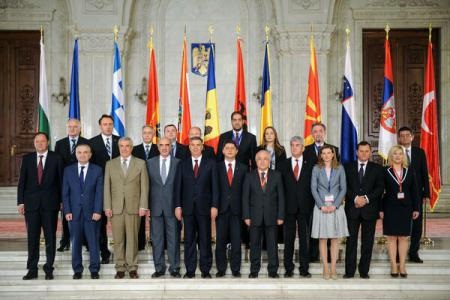
Bucharest - Southeast European countries took a new step in institutionalising their cooperation by inaugurating the Parliamentary Assembly of the Southeast European Cooperation Process (SEECP) in Bucharest on Saturday.
The SEECP Parliamentary Assembly should strengthen this initiative, launched in 1996, and the only forum of regional cooperation established and conducted by the member states themselves. The initiative was launched by Bulgaria in response to the emergence of news states following the break-up of Yugoslavia. SEECP members are: Albania, Bosnia and Herzegovina, Bulgaria, Croatia, Greece, Macedonia, Moldova, Montenegro, Romania, Serbia, Slovenia and Turkey.
Further institutionalisation of the SEECP should strengthen political cooperation and cooperation in infrastructure, transport, the fight against organised crime, and energy. Over the next year the SEECP will be chaired by Albania. The SEECP body, the Regional Cooperation Council, is already operating out of Sarajevo. Decisions on the seat of the organisation's Secretariat and financing will be made later. Istanbul, Sarajevo and Sofia are candidates for the seat of the Secretariat.
On the margins of the meeting, Croatian Parliament Speaker Josip Leko met with his Turkish counterpart Cemil Cicek, who asked Croatia to support Istanbul's candidacy for the seat of the SEECP Secretariat. Leko gave his support in principle, but added that he should have further consultations because Croatia had originally proposed that the Secretariat should be based in Sarajevo.
Leko said at the meeting that Croatia, the newest member of the European Union, remained committed to cooperation in the region, which he said had seen both positive and negative changes in the last year. Among the positive changes, Leko mentioned the opening of membership negotiations between the EU and Serbia, the fact that Montenegro has opened and closed several negotiating chapters, the chances of Albania receiving EU membership candidate status in June and the lifting of visa requirements for citizens of Moldova.
Among the negative changes, he cited the crisis in Ukraine, which he said was adversely affecting the situation in Southeast Europe both politically and economically, especially with regard to energy security. Leko said that the SEECP Parliamentary Assembly should provide a framework for regional cooperation, citing closer infrastructure and energy ties, exchange of information on measures to boost growth, job creation and increasing living standards.
On Sunday, Leko is scheduled to visit the Croatian minority in the Timisoara area. (Hina)